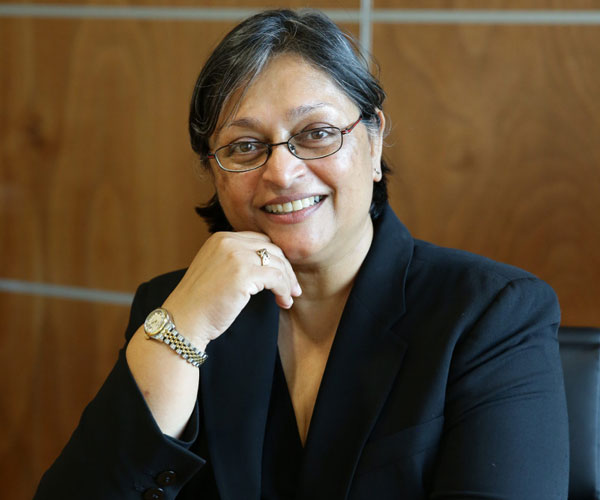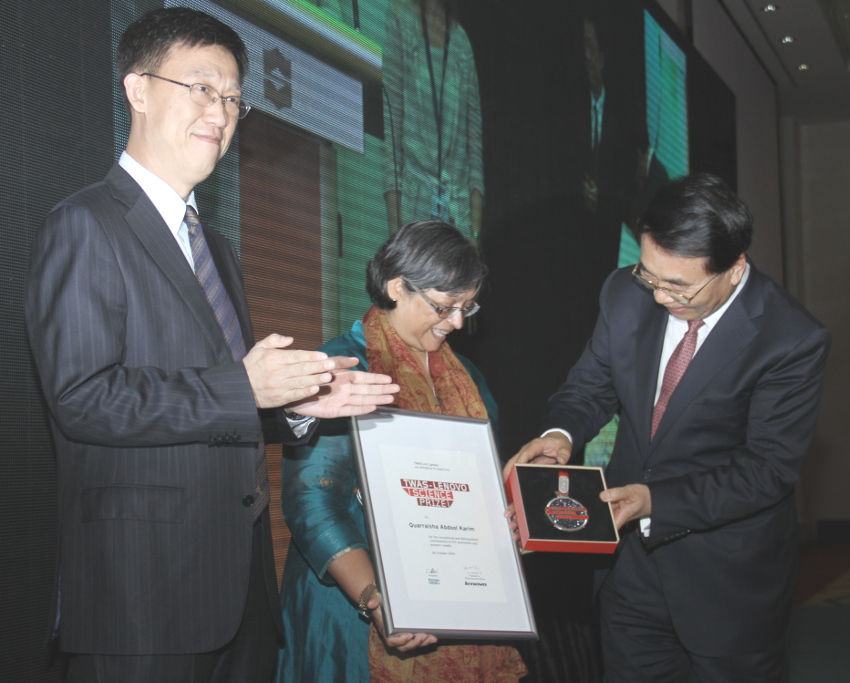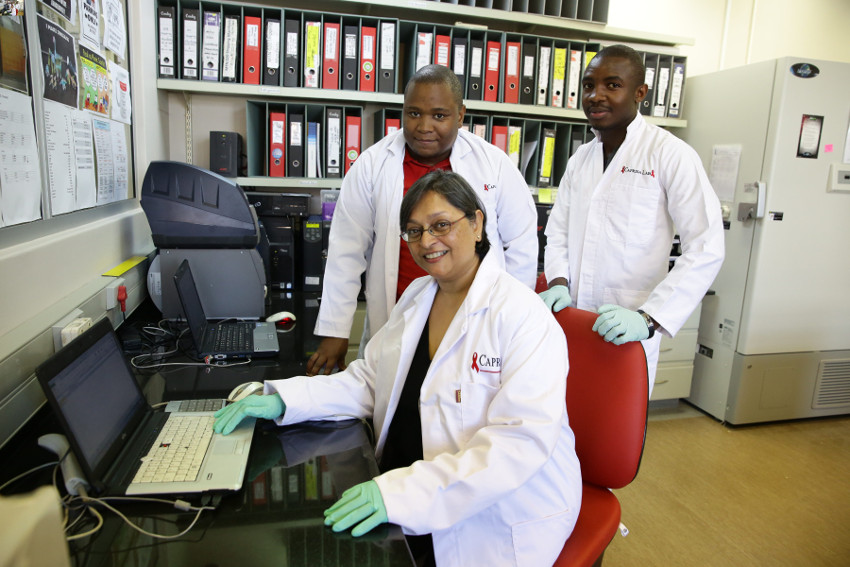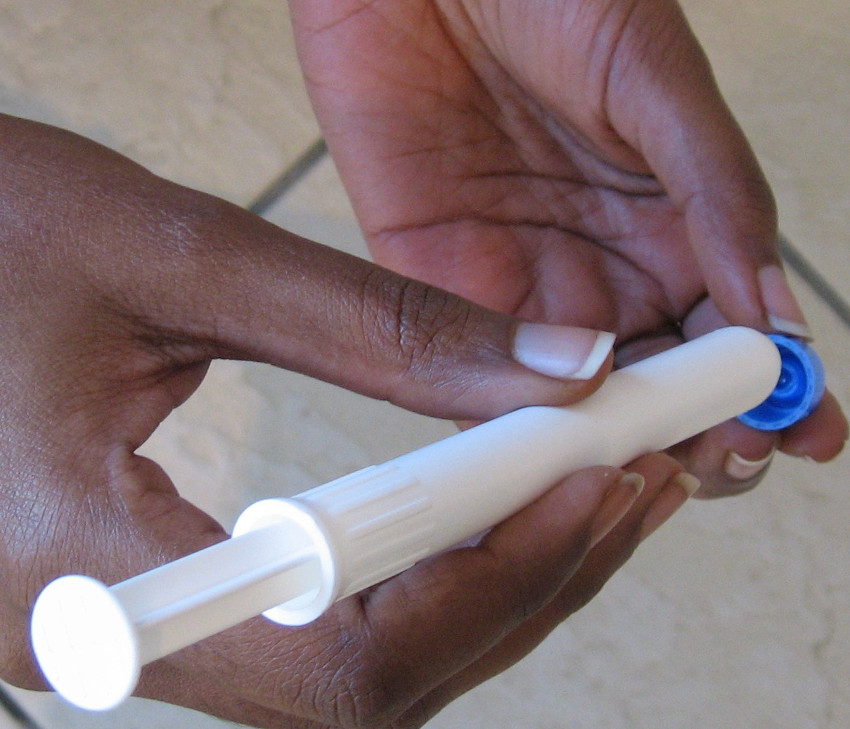MUSCAT, Sultanate of Oman – South African epidemiologist Quarraisha Abdool Karim was named winner of the 2014 TWAS-Lenovo Science Prize Sunday for her life-saving research into medical and social strategies against HIV and AIDS. The award, one of the most prestigious honours given to scientists from the developing world, was announced here in a special ceremony during the yearly General Meeting of The World Academy of Sciences (TWAS).
Abdool Karim's work focuses on a topical anti-HIV gel that appears to dramatically reduce HIV infection, while giving women direct, effective control over their health. The annual prize includes an award of USD100,000 provided by Lenovo, the global leader in consumer, commercial, and enterprise technology that is the largest PC company in the world.
"We have a great admiration and respect for the work of Dr. Abdool Karim," said TWAS President Bai Chunli. "She has an exemplary record of high-impact science, and there is a deep humanity to her work. Just as important, she has helped to train hundreds of young African scientists who are expanding the research into HIV and tuberculosis. She really is a model scientist, and a tremendous inspiration to colleagues across the world."
"Innovation is how Lenovo achieves competitive differentiation and drives new market opportunities. Lenovo's global scale and emphasis on innovation give us a degree of visibility regarding the health and well-being of the communities and markets we serve," said Yuanqing Yang, Chairman & CEO of Lenovo. "Dr. Quarraisha Abdool Karim stands out for her exceptional record of research and her remarkable grass-roots engagement. Through her creativity and hard work, she has helped to save countless lives. We are very proud that she has won the 2014 TWAS-Lenovo Science Prize."
 Abdool Karim said she is humbled by the award. "South Africa is an important and key population in terms of AIDS research," she said. "With our contributions to this field, I think it adds an advantage to have this kind of acclamation. I feel very privileged and honoured to be the recipient of this award.
Abdool Karim said she is humbled by the award. "South Africa is an important and key population in terms of AIDS research," she said. "With our contributions to this field, I think it adds an advantage to have this kind of acclamation. I feel very privileged and honoured to be the recipient of this award.
“By preventing HIV infection in women,” said Abdool Karim, “we have the potential of altering the epidemic in many settings and saving many millions of lives.”
Abdool Karim's discoveries have shaped life-saving clinical guidelines for patients infected with a combination of HIV and tuberculosis in countries across the world. It has also found the potential basis for an HIV vaccine. But her most celebrated work is for a finding that could save millions of lives: a study demonstrating the effectiveness of tenofovir gel, a substance that women can use to protect themselves from HIV infection with no cooperation necessary from men.
Follow the 2014 General Meeting at TWAS’s Facebook page. On Twitter, follow the hashtag #TWASmtg. On Flickr, visit TWAS's photostream. To learn more about the meeting, download the programme.
In Sub-Saharan Africa, HIV and AIDS are an ever-present threat. The region contains a majority of the 33 million people worldwide who live with HIV. Data collected in 2012 by the US Agency for International Development shows that, in South Africa alone, an estimated 6.1 million people suffer from HIV infection, more than any other nation in the world and 17.9% of the country’s entire population. For women in sub-Saharan Africa, the situation is especially grave. Women who are younger than 24 are up to eight times more likely to have HIV than young men of the same age range.
 Abdool Karim grew up in apartheid South Africa, where social inequality was notorious and pervasive. She got her master’s degree in 1988 at Columbia University’s School of Public Health in New York (United States), and the next year joined the South African Medical Research Council’s AIDS Research Programme. She went into AIDS research, she explained in an interview, because social justice is a part of epidemiology. “AIDS brought together two separate things for me,” said Abdool Karim. “I saw a convergence between advocacy work and science.”
Abdool Karim grew up in apartheid South Africa, where social inequality was notorious and pervasive. She got her master’s degree in 1988 at Columbia University’s School of Public Health in New York (United States), and the next year joined the South African Medical Research Council’s AIDS Research Programme. She went into AIDS research, she explained in an interview, because social justice is a part of epidemiology. “AIDS brought together two separate things for me,” said Abdool Karim. “I saw a convergence between advocacy work and science.”
At that time, she became curious about why HIV had become a serious threat in Central, East and West Africa, yet the news rarely mentioned the virus in the southern countries. Her early work uncovered the frightening reality that South Africa was at an early stage of an HIV epidemic, that women were already three times more likely than men to be infected and that women also became infected at an age five to seven years younger than men.
Abdool Karim said it eventually became clear that these women already knew how to prevent HIV infection. “But they felt powerless in negotiating their partners’ monogamy," she explained. "There were women saying, ‘You know, I can be faithful, I can be monogamous, but at the end of the day, what my partner does is putting me at risk. And my partner refuses to wear a condom. So we need something for ourselves so I can exercise my right to be uninfected.’”
Women are usually stuck in these relationships, she added, because they’re economically dependent on the men. “If you are dependent on a man for survival in whatever form, or even if you love someone, and this person has other partners, you’re at risk.”
 In 1994, she began looking for a way for women to protect themselves from HIV that didn’t depend on the cooperation of men. In time, an antiretroviral drug called tenofovir with a long shelf life and a reputation for safety captured her attention. After she co-founded the Centre for the AIDS Programme of Research in South Africa (CAPRISA) in Durban, South Africa, in 2002, her team tested a gel version of tenofovir in a study of 889 women that spanned nearly three years. This led to her most well-known discovery: that tenofovir gel, when topically applied to the genital area, reduced HIV infection in women by 39% -- and by 54% among those who used it the most. The results won widespread acclaim, and were published in the prestigious journal Science in 2011 and made headlines in the New York Times, The Guardian, Washington Post, Nature and the Wall Street Journal.
In 1994, she began looking for a way for women to protect themselves from HIV that didn’t depend on the cooperation of men. In time, an antiretroviral drug called tenofovir with a long shelf life and a reputation for safety captured her attention. After she co-founded the Centre for the AIDS Programme of Research in South Africa (CAPRISA) in Durban, South Africa, in 2002, her team tested a gel version of tenofovir in a study of 889 women that spanned nearly three years. This led to her most well-known discovery: that tenofovir gel, when topically applied to the genital area, reduced HIV infection in women by 39% -- and by 54% among those who used it the most. The results won widespread acclaim, and were published in the prestigious journal Science in 2011 and made headlines in the New York Times, The Guardian, Washington Post, Nature and the Wall Street Journal.
One tenofovir gel trial participant, Gabi Nxele, is the central part of the story told in “Gabi’s Gift”, a 5-minute film about the finding produced by CAPRISA. “One of my friends was dying with HIV, but I don’t want to see other people die with HIV,” she said. “Me, and my sister, and all of the women of the world.”
The finding generated excitement largely because mathematical models have shown that widespread use of tenofovir gel in South Africa could prevent over half a million new HIV infections over the next decade. But before tenofovir gel can be licensed, manufactured in South Africa and distributed locally, it must pass a second trial confirming Abdool Karim’s results. That study is currently underway and expected to finish in the first half of 2015.
 Other celebrated findings in HIV research by Abdool Karim and her CAPRISA colleagues are also making waves. For example, they have demonstrated that combining treatments for HIV and tuberculosis can reduce the death rate of those infected with both diseases by more than half. Those results, published in 2010 the New England Journal of Medicine, have influenced the management of 1.1 million patients affected by both diseases, according to a 2013 World Health Organization report. CAPRISA projects that the new guidelines will avert about 10,000 deaths a year in South Africa alone. Another discovery, based on observations on a woman’s antibodies from the tenofovir gel study, was published in Nature Medicine in 2012 and could provide the foundation for the development of an HIV vaccine.
Other celebrated findings in HIV research by Abdool Karim and her CAPRISA colleagues are also making waves. For example, they have demonstrated that combining treatments for HIV and tuberculosis can reduce the death rate of those infected with both diseases by more than half. Those results, published in 2010 the New England Journal of Medicine, have influenced the management of 1.1 million patients affected by both diseases, according to a 2013 World Health Organization report. CAPRISA projects that the new guidelines will avert about 10,000 deaths a year in South Africa alone. Another discovery, based on observations on a woman’s antibodies from the tenofovir gel study, was published in Nature Medicine in 2012 and could provide the foundation for the development of an HIV vaccine.
Abdool Karim has served as a consultant to the World Health Organization, the Joint United Nations Programme on HIV/AIDS (UNAIDS), the United Nations Development Programme and the United Nations Children’s Fund. She also serves UNAIDS as a member of the UNAIDS Expert Panel on HIV Prevention and as scientific spokesperson on HIV science. In 2012, she won the TWAS Prize for Medical Science.
This is the second year of the TWAS-Lenovo Science Prize, the successor to The Ernesto Illy Trieste Science Prize that ran for eight years. During its first four-year cycle (2013-2016), the TWAS-Lenovo Prize subject is focusing on the basic sciences, with the subject area changing each year: physics and astronomy in 2013; biological sciences in 2014; mathematics in 2015; and chemical sciences in 2016.
Read an Italian version of this article
*****
ABOUT LENOVO
Lenovo (HKSE: 992) (ADR: LNVGY) is a $39 billion global Fortune 500 company and a leader in providing innovative consumer, commercial, and enterprise technology. Our portfolio of high-quality, secure products and services covers PCs (including the legendary Think and multimode Yoga brands), workstations, servers, storage, smart TVs and a family of mobile products, including smartphones, tablets and apps. Join us on LinkedIn, follow us on Facebook or Twitter (@Lenovo) or visit us at www.lenovo.com.
ABOUT TWAS
The World Academy of Sciences for the advancement of science in developing countries – TWAS – works to advance sustainable prosperity through research, education, policy and diplomacy. TWAS was founded in 1983 by a distinguished group of scientists from the developing world, under the leadership of Abdus Salam, the Pakistani physicist and Nobel Prize winner. Today, TWAS has some 1,150 elected Fellows from 90 countries; 15 of them are Nobel laureates. TheAcademy is based in Trieste, Italy, on the campus of the Abdus Salam International Centre for Theoretical Physics (ICTP). Through more than three decades, its mission has focused on supporting and promoting excellence in scientific research in the developing world and applying scientific and engineering research to address global challenges. TWAS receives core funding from the Government of Italy. The United Nations Educational, Scientific and Cultural Organization (UNESCO) administers TWAS funds and personnel. Follow TWAS on Facebook or Twitter (@TWASnews) or visit the Academy's website at www.twas.org.
Sean Treacy

